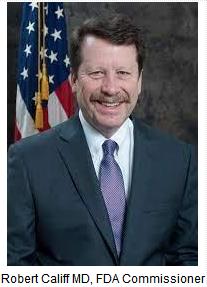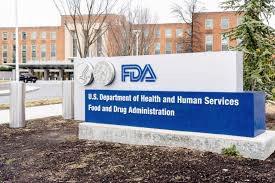 A report analyzing the structure and effectiveness of the Food and Drug Administration requested by Commissioner by Dr. Robert Califf in July was released in November. The FDA is responsible for oversight of the U. S. food industry with sales of $1.5 trillion and is also charged with ensuring the wholesomeness of imported foods.
A report analyzing the structure and effectiveness of the Food and Drug Administration requested by Commissioner by Dr. Robert Califf in July was released in November. The FDA is responsible for oversight of the U. S. food industry with sales of $1.5 trillion and is also charged with ensuring the wholesomeness of imported foods.
Under extreme pressure from media and Congress Dr. Califf had no option other than to go outside his Agency to obtain an impartial and objective evaluation of operations relating to the food-related activities of the FDA. Questions concerning the effectiveness of the Agency have received recent attention and especially a publication by Helena Bottemiller Evich, an experienced investigative journalist. Public and institutional concern has followed revelations of inactivity over heavy metal contamination of juices, Cronobacter in infant formula and ongoing foodborne disease outbreaks.
The expert panel that reviewed the FDA was headed by Dr. Jane Henney, a former Commissioner of Food and Drugs and included five research specialists and past regulators. The panel reviewed the structure and leadership of the FDA, available resources and the authority vested in the Agency. Dr. Henney characterized the report as “providing constructive recommendations that will take time to work through and implement but will benefit the health and safety of the American public”.
 The panel through interviews and evaluation of organizational charts demonstrated that food is a stepchild of the FDA compared to drugs and medical devices. The report noted that the Human Foods Program has “contributed to a culture of indecisiveness and inaction and created disincentives for collaboration”. In 2019, the FDA organizational structure was modified resulting in the elimination of the position of the Deputy Commissioner for Foods and Veterinary Medicine. The respective heads of the Center for Food Safety and Applied Science, the Office of Food Policy and Response and the Office of Regulatory Affairs all were reassigned to report directly to the Commissioner of the FDA in addition to other functions relating to drugs. This diluted the effectiveness of the Human Foods Program. In the absence of a clear chain of command, functions within the FDA operated without consultation, resulting in duplication and omissions. The report specifically cited the infant formula crisis that emerged in 2021 as an example of structural and organizational deficiency. The report recommended the restoration of a Deputy Commissioner for food-related matters, reporting directly to the Commissioner and coordinating relevant working groups.
The panel through interviews and evaluation of organizational charts demonstrated that food is a stepchild of the FDA compared to drugs and medical devices. The report noted that the Human Foods Program has “contributed to a culture of indecisiveness and inaction and created disincentives for collaboration”. In 2019, the FDA organizational structure was modified resulting in the elimination of the position of the Deputy Commissioner for Foods and Veterinary Medicine. The respective heads of the Center for Food Safety and Applied Science, the Office of Food Policy and Response and the Office of Regulatory Affairs all were reassigned to report directly to the Commissioner of the FDA in addition to other functions relating to drugs. This diluted the effectiveness of the Human Foods Program. In the absence of a clear chain of command, functions within the FDA operated without consultation, resulting in duplication and omissions. The report specifically cited the infant formula crisis that emerged in 2021 as an example of structural and organizational deficiency. The report recommended the restoration of a Deputy Commissioner for food-related matters, reporting directly to the Commissioner and coordinating relevant working groups.
 Neglect of food-related responsibilities is evidence by the 240 vacancies in the Human Foods Program and the fact that the Center for Food Safety and Applied Nutrition currently has the same number of full-time employees as were employed in 1978. Deficiencies in the organizational structure were obviously exacerbated by interpersonal factors as detailed in a 2022 investigative report on the FDA and its activities with respect to food.
Neglect of food-related responsibilities is evidence by the 240 vacancies in the Human Foods Program and the fact that the Center for Food Safety and Applied Nutrition currently has the same number of full-time employees as were employed in 1978. Deficiencies in the organizational structure were obviously exacerbated by interpersonal factors as detailed in a 2022 investigative report on the FDA and its activities with respect to food.
The Reagan-Udall Foundation report recommended that funding should be increased to hire suitably qualified, trained and able scientists and administrators who command salaries in industry and academia beyond the scale offered by the FDA. The report also recommended that the FDA has been reticent to exercise its recall authority, leading to delays in removing potentially harmful products from supply chains.
Response to the report has been generally favorable, especially with regard to Commissioner Califf who initiated the process. Brian Ronholm, Director for Food Policy at Consumer Reports, noted, “We cannot afford to tolerate the status quo and let this moment go by without adopting fundamental changes to improve the ability of FDA to protect the public and ensure our food is safe.” Outgoing House Appropriations Chair, Rosa DeLauro (D-CT) urged a positive response by Commissioner Califf noting, “FDA needs a change, and the Reagan-Udall Report is a formal acknowledgement of the issues plaguing the food program that begins to chart that path forward.”
In response to the report, Commissioner Califf stated, “The Agency is committed to providing a public update on the new vision at the end of January 2023.” He added, “I will closely oversee the Human Foods Program until a determination is made on how we will strengthen and modernize the Program.” He concluded by stating, “I am fully committed to building a world-class Human Foods Program that works best for the public, our stakeholders and our employees and that will allow us to effectively deliver on our mission.
One of the options offered in the report comprised separation of the food responsibilities from the FDA and assigning responsibility to a dedicated food safety agency as in the EU. It is this commentator’s belief that ultimately this radical departure will occur, especially if the recommended changes in structure and additional funding do not result in a more proactive and effective outcome. Any serious crisis to emerge relating to either domestic or imported food may energize Congress and generate a groundswell for a radical but ultimately effective transition
It is hoped that real progress will follow the Reagan-Udall Foundation report and that subsequent action will rise to a level higher than moving the deck chairs on the Titanic.”